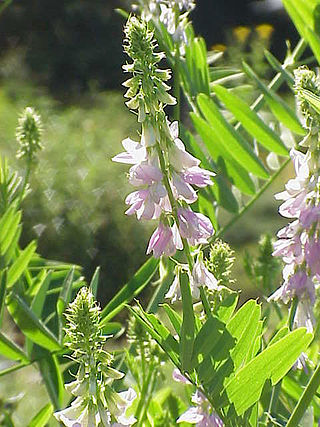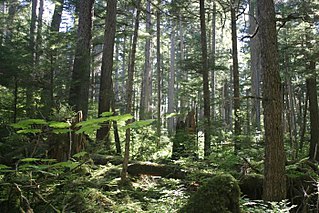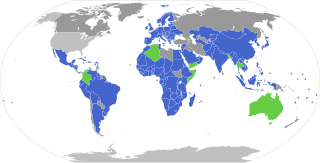Related Research Articles

The Convention on Biological Diversity (CBD), known informally as the Biodiversity Convention, is a multilateral treaty. The Convention has three main goals: the conservation of biological diversity ; the sustainable use of its components; and the fair and equitable sharing of benefits arising from genetic resources. Its objective is to develop national strategies for the conservation and sustainable use of biological diversity, and it is often seen as the key document regarding sustainable development.

Biodiversity or biological diversity is the variety and variability of life on Earth. Biodiversity is a measure of variation at the genetic, species, and ecosystem level.

Bioprospecting is the exploration of natural sources for small molecules, macromolecules and biochemical and genetic information that could be developed into commercially valuable products for the agricultural, aquaculture, bioremediation, cosmetics, nanotechnology, or pharmaceutical industries. In the pharmaceutical industry, for example, almost one third of all small-molecule drugs approved by the U.S. Food and Drug Administration (FDA) between 1981 and 2014 were either natural products or compounds derived from natural products.

The Zapatista Army of National Liberation, often referred to as the Zapatistas, is a far-left political and militant group that controls a substantial amount of territory in Chiapas, the southernmost state of Mexico.
Overton Brent Berlin is an American anthropologist, most noted for his work with linguist Paul Kay on color, and his ethnobiological research among the Maya of Chiapas, Mexico.
Natural heritage refers to the sum total of the elements of biodiversity, including flora and fauna, ecosystems and geological structures. It forms part of our natural resources.

The Lacandon Jungle is an area of rainforest which stretches from Chiapas, Mexico, into Guatemala. The heart of this rainforest is located in the Montes Azules Biosphere Reserve in Chiapas near the border with Guatemala in the Montañas del Oriente region of the state. Although much of the jungle outside the reserve has been cleared, the Lacandon is still one of the largest montane rainforests in Mexico. It contains 1,500 tree species, 33% of all Mexican bird species, 25% of all Mexican animal species, 56% of all Mexican diurnal butterflies and 16% of all Mexico's fish species.

Genetic Alliance is a nonprofit organization, founded in 1986 by Joan O. Weiss, working with Victor A. McKusick, to advocate for health benefits in the accelerating field of genomic research. This organization is a network of over 1,000 disease advocacy organizations, universities, government organizations, private companies, and public policy organizations. They aim to advance genetic research agendas toward health benefit by engaging a broad range of stakeholders, including healthcare providers, researchers, industry professionals, public policy leaders, as well as individuals, families and communities. They create programs using a collaborative approach, and aim to increase efficiency and reduce obstacles in genetic research, while ensuring that voices from the involved disease communities are heard. They also promote public policies to advance healthcare. Genetic Alliance provides technical support and informational resources to guide disease-specific advocacy organizations in being their own research advocates. They also maintain a biobank as a central storage facility for several organizations who otherwise would not have the infrastructure to maintain their own repository.

Plant Resources of Tropical Africa, known by its acronym PROTA, is a retired NGO and interdisciplinary documentation programme active between 2000 and 2013. PROTA produced a large database and various publications about Africa's useful plants.
The Health and Retirement Study (HRS) is a longitudinal survey of a representative sample of Americans over age 50 conducted by the Survey Research Center (SRC) at the Institute for Social Research (ISR) at the University of Michigan in Ann Arbor and supported by the National Institute on Aging (NIA). The study interviews approximately 20,000 respondents every two years on subjects like health care, housing, assets, pensions, employment and disability. The study is managed through a cooperative agreement between the NIA, which provides primary funding, and the ISR, which administers and conducts the survey. Beginning in 2012, HRS began adding genetic information from consenting participants to its database. The economic measures captured by the data in the HRS are regarded as being of very high quality.

Natural resource management (NRM) is the management of natural resources such as land, water, soil, plants and animals, with a particular focus on how management affects the quality of life for both present and future generations (stewardship).
Livestock Keepers' Rights are a bundle of rights that would support the survival of small-scale livestock keepers such as pastoralists, smallholders and family farms in a general policy environment that favours large-scale industrial modes of livestock production. In the context of the current anti-livestock agenda and the claim by commercial interests that livestock will be eliminated by 2035, they are gaining added traction.

The Nagoya Protocol on Access to Genetic Resources and the Fair and Equitable Sharing of Benefits Arising from their Utilization to the Convention on Biological Diversity, also known as the Nagoya Protocol on Access and Benefit Sharing (ABS) is a 2010 supplementary agreement to the 1992 Convention on Biological Diversity (CBD). Its aim is the implementation of one of the three objectives of the CBD: the fair and equitable sharing of benefits arising out of the utilization of genetic resources, thereby contributing to the conservation and sustainable use of biodiversity. It sets out obligations for its contracting parties to take measures in relation to access to genetic resources, benefit-sharing and compliance.
The Maya ICBG bioprospecting controversy took place in 1999–2000, when the International Cooperative Biodiversity Group led by ethnobiologist Dr. Brent Berlin was accused of engaging in unethical forms of bioprospecting (biopiracy) by several NGOs and indigenous organizations. The ICBG had as its aim to document the biodiversity of Chiapas, Mexico and the ethnobotanical knowledge of the indigenous Maya people – to ascertain whether there were possibilities of developing medical products based on any of the plants used by the indigenous groups.

The Biological Diversity Act, 2002 is an Act enacted by the Parliament of India for the preservation of biological diversity in India, and provides mechanism for equitable sharing of benefits arising out of the use of traditional biological resources and knowledge. The Act was enacted to meet the obligations under the Convention on Biological Diversity (CBD), because India is a party of the convention {meeting}.
An Access and Benefit Sharing Agreement (ABSA) is an agreement that defines the fair and equitable sharing of benefits arising from the use of genetic resources. ABSAs typically arise in relation to bioprospecting where indigenous knowledge is used to focus screening efforts for commercially valuable genetic and biochemical resources. ABSAs recognise that bioprospecting frequently relies on indigenous or traditional knowledge, and that people or communities who hold such knowledge are entitled to a share of benefits arising from its commercial utilization.
Plant genetic resources describe the variability within plants that comes from human and natural selection over millennia. Their intrinsic value mainly concerns agricultural crops.
Adina Merenlender is a Professor of Cooperative Extension in Conservation Science at University of California, Berkeley in the Environmental Science, Policy, and Management Department, and is an internationally recognized conservation biologist known for land-use planning, watershed science, landscape connectivity, and naturalist and stewardship training.
Biopiracy is defined as the unauthorized appropriation of knowledge and genetic resources of farming and indigenous communities by individuals or institutions seeking exclusive monopoly control through patents or intellectual property. While bioprospecting is the act of exploring natural resources for undiscovered chemical compounds with medicinal or anti-microbial properties, commercial success from bioprospecting leads to the company's attempt at protecting their intellectual property rights on indigenous medicinal plants, seeds, genetic resources, and traditional medicines.
References
- ↑ Francesca Grifo, Joshua Rosenthal. 1997. Biodiversity and Human Health. Island Press pp. 282 - 300
- ↑ "Home". icbg.org.
- ↑ "William L. Brown Center".
- ↑ "Panama ICBG Program - Home". Archived from the original on 2012-07-24. Retrieved 2012-05-01.
- ↑ "College of Pharmacy - Chicago | Rockford | University of Illinois Chicago".
- ↑ "ICBG Groups". Archived from the original on 2012-10-31. Retrieved 2012-05-01.
- ↑ Feinholz-Klip, Dafna; García Barrios, Luis; Cook Lucas, Julie (2009). "The Limitations of Good Intent: Problems of Representation and Informed Consent in the Maya ICBG Project in Chiapas, Mexico". In Wynberg, Rachel; Doris Schroeder; Roger Chennells (eds.). Indigenous Peoples, Consent and Benefit Sharing. Springer Netherlands. pp. 315–331. doi:10.1007/978-90-481-3123-5_17. ISBN 978-90-481-3123-5.
- ↑ Hayden, Cori (2003). When Nature Goes Public: The Making and Unmaking of Bioprospecting in Mexico. Princeton University Press. pp. 100–105.
- ↑ James V. Lavery (2007). "Case 1: Community Involvement in Biodiversity Prospecting in Mexico". Ethical Issues in International Biomedical Research: A Casebook. Oxford University Press. pp. 21–42.
- ↑ Rosenthal, Joshua. .The International Cooperative Biodiversity Groups (ICBG) Program. Archived 2017-10-19 at the Wayback Machine